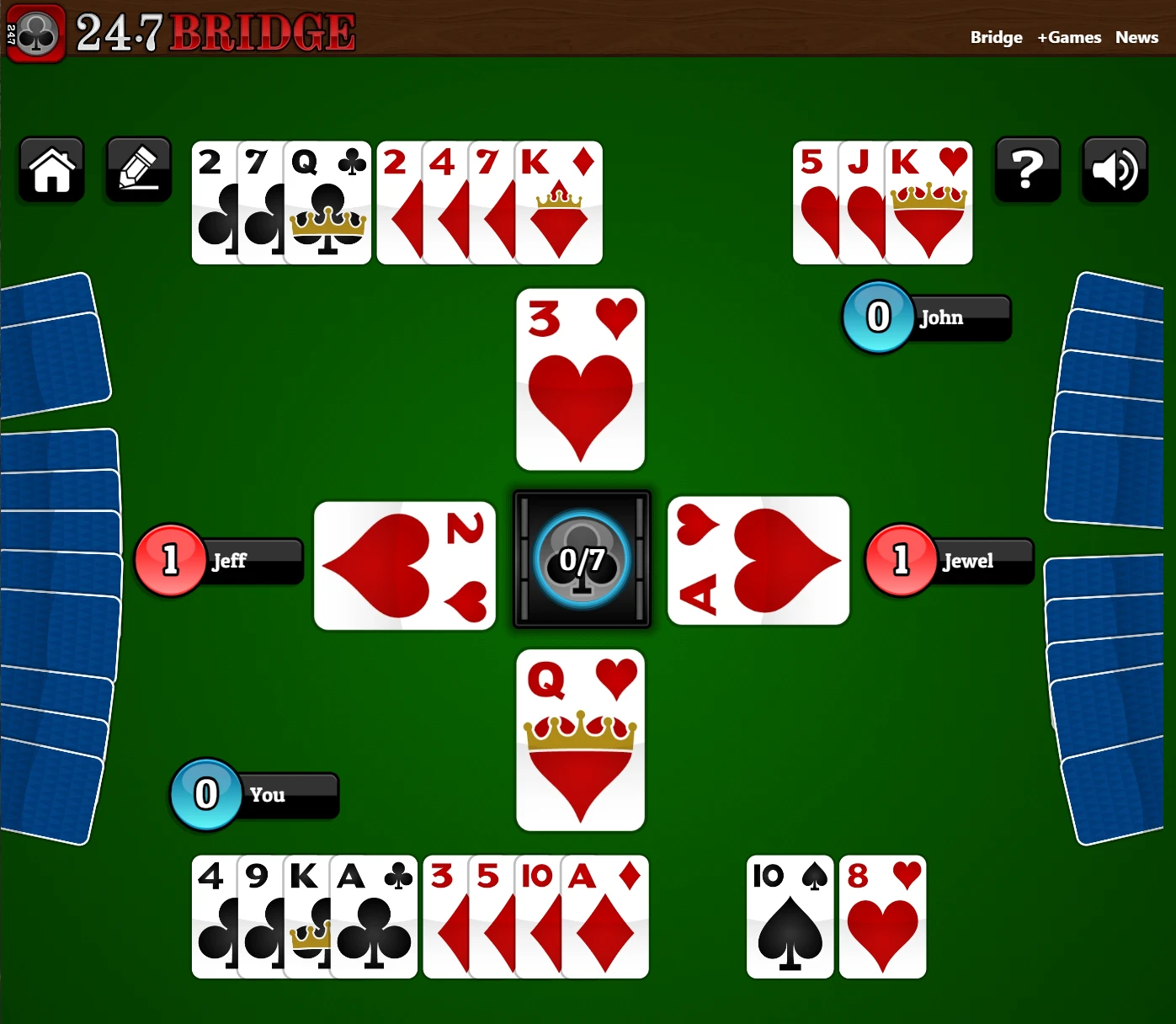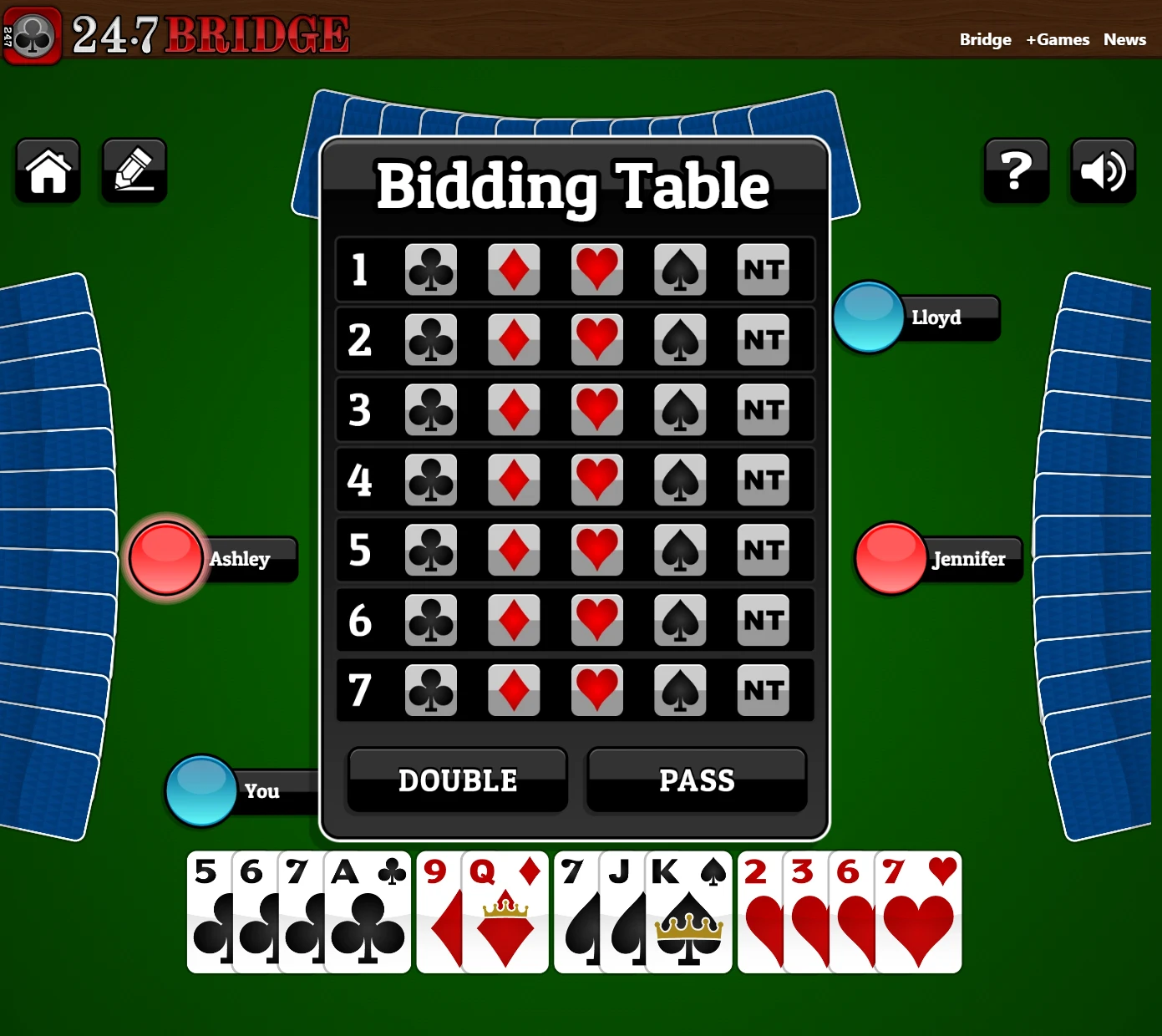Counting Points in Bridge: Essential Tips for Players

The team with the highest score in a bridge match wins. Scores depend on bids made in the bidding phase, the number of tricks won, and any bonuses.
Getting to grips with bridge scoring can seem daunting at first, but this guide simplifies everything for you. We explore how bridge points work, how to count them as a beginner, high card points in bridges, and some strategies you can use to increase your score. Let’s get started!
Understanding Bridge Points

The goal in bridge is to win tricks to earn the highest score. The size of your final point score depends on decisions made in the bidding phase and the outcome of the game played with your hand.
Games begin with a bidding phase where teams bid on how many tricks they believe they will score above six. A conservative bid could be “1 trick” (for a total of 7) while an aggressive one might be “5 tricks” (for a total of 11).
Players can determine how aggressive they want to be from their hand (of 13 cards). If they believe they have a good hand, they can bet more.
The bidding process continues until three players in a row pass. The winning bidder then gets an opportunity to win points (with the help of their partner across the table). The team that passed on bidding becomes the “defender.”
The card rank order for each suit in bridge games is Ace, King, Queen, Jack, 10, 9, 8, 7, 6, 5, 4, 3, and 2. Higher cards win tricks. The trump suit is named by the winning bidder (the one they believe will win them the most tricks). Depending on their hand, the bidder can choose any suit to be the trump suit (the most valuable). Any card in the trump suit can win the trick, unless another player lays a higher card.
Bidders can also choose no trump suit or “NT.” Here, all corresponding cards in each suit perform equally for tricks.
Bridge players can also take on more risk by betting “double” or “redouble.” Doubling doubles trick scores while redoubling quadruples them.
Counting Points: A Beginner's Guide
During games players play cards from their hands in turn, attempting to win the trick. Higher cards and those in the trump suit are more likely to win.
To start scoring, players must exceed the six-suit minimum at the end of the game. (Points only begin at the seventh trick). Moreover, point scoring varies according to suit type.
Traditionally, scoring by suit is as follows:
- 20 points in clubs and diamonds
- 30 points in hearts and spades
- 40 points for NT in trick 7, and 30 points for tricks over that
For example, under standard scoring, a player might have 1 trick in hearts and earn 30 points.
Doubling and redoubling up the ante, increasing scoring significantly. For example, a doubled club or diamond is worth 40 points, while a doubled heart and spade is worth 60 points. The first NT trick is worth 80 and each subsequent one is worth 60.
Redoubling increases potential point scoring further. Each club or diamond trick is worth 80 while each heart of spade is worth 120. The first NT trick is worth 160 while subsequent tricks are worth 120.
Players score regular points in bridge up to the value of their bid under the scoresheet’s horizontal line. If teams win more tricks than they bid, they can add the trick value above the line.
Once a team scores over 100 points below the line, they win the game and draw an additional line underneath, indicating a new game is about to start. Players complete two games (called a rubber) and then add all their scores under and over the line to determine the overall winner.
When a team wins the first game, they become “vulnerable.” This status increases their points scores if successful, but also increases their penalties.
Penalties
If a team fails to meet their contract bid’s trick number, they must enter a penalty above the line. The standard penalty for missing a bid is 50 penalty points for each trick short. For example, if the bidding team bid 8 tricks and only achieved 6, then their penalty would be -100.
If the team is vulnerable, their penalty for each trick missed is -100. Therefore, being two tricks short would reduce their score by -200.
For doubled bids, losses are higher. Non-vulnerable doubled contracts see losses of 100 points for the first trick, 200 points for the second and third trick, and 300 points for subsequent tricks. For vulnerable doubled contracts, the losses are 200 points for the first trick and 300 points for the second and subsequent tricks.
For redoubled scoring, the losses can be even more extreme. In non-vulnerable situations, players lose 200 points for the first undertrick, 400 each for the second and third undertricks, and 600 for each subsequent undertrick. For vulnerable players, it is -400 for the first undertrick and -600 from the second undertrick onwards.
Overtricks
Sometimes teams will win more tricks than they bid initially. For example, they might bet on 1 trick (above the six initial tricks) but score 3 tricks. If this happens, they earn extra points.
Each overtrick pays the trick value if undoubled. If doubled, it pays 100 if not vulnerable, and 200 if vulnerable. If redoubled, it pays 200 if not vulnerable, and 400 if vulnerable.
Bonuses
Bonuses are also sometimes available. These reflect the risks players take in the bidding process.
For example, players can make a “small slam” bid where they commit to winning 12 of the 13 tricks in a hand based on the strength of their cards. A non-vulnerable small slam earns 500 additional points, while a vulnerable one earns 750 points.
A “grand slam bid” means winning 13 tricks of 13. It pays 1,000 points if not vulnerable, and 1,500 if vulnerable.
Tips for Maximizing Your Points
You can maximize your points in bridge by:
- Assessing your hand and evaluating the risk you can take
- Using doubled or redoubled options when bidding
- Avoiding missing out on your bidded trick number
Don’t forget: you can play bridge for free online at 247 Bridge and test yourself against the computer. Try it today.
Seasonal Bridge Games
More Games
Bridge News
Disclaimer
DISCLAIMER: The games on this website are using PLAY (fake) money. No payouts will be awarded, there are no "winnings", as all games represented by 247 Games LLC are free to play. Play strictly for fun.

































